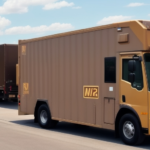Understanding UPS Commercial Shipping Rates
If you're a business owner looking to ship your products, it's essential to understand how UPS commercial shipping rates work. UPS offers a range of shipping options tailored for businesses, and rates can vary based on several factors. In this article, we'll explore the factors that influence UPS commercial shipping rates, methods to calculate them, and strategies to reduce shipping costs.
Factors Affecting UPS Commercial Shipping Rates
Package Weight and Size
The weight and dimensions of your package are primary determinants of shipping costs. UPS uses a pricing structure based on the greater of the actual weight or dimensional weight of the package. Dimensional weight is calculated by multiplying the length, width, and height of the package and dividing by a divisor set by UPS, typically around 139.
Destination and Distance
The shipping destination significantly impacts rates. Domestic shipments generally cost less than international ones due to shorter transportation distances and lower associated costs. Additionally, shipping to remote or hard-to-reach areas may incur additional surcharges.
Shipping Volume and Frequency
Businesses that ship frequently or in large volumes can negotiate better rates with UPS. Higher shipping volumes often qualify for significant discounts, making regular shipments more cost-effective. According to a 2023 Statista report, businesses increasing their shipping frequency can reduce costs by up to 20% through negotiated rates.
Type of Service
UPS offers various service levels, including ground, air, and international shipping. Faster services like next-day delivery cost more, while ground shipping is more economical but takes longer. Choosing the right service level based on your delivery requirements can optimize costs.
Seasonal Variations
During peak seasons, such as the holiday period, shipping rates may increase due to higher demand. Planning shipments during off-peak times or utilizing UPS's seasonal discounts can help manage costs effectively.
Calculating and Optimizing UPS Commercial Shipping Rates
Using the UPS Shipping Calculator
UPS provides a shipping calculator on their website, allowing businesses to estimate shipping costs accurately. By entering package weight, dimensions, destination, and preferred service level, you can obtain a reliable cost estimate before shipping.
Considering Packaging Materials
Optimizing packaging to minimize weight and dimensions can lead to significant savings. Using lightweight materials and right-sizing packages not only reduces shipping costs but also enhances sustainability efforts.
Utilizing UPS Online Tools and Discounts
UPS offers various online tools and resources, such as UPS WorldShip and UPS CampusShip, which streamline the shipping process and provide access to exclusive discounts. Leveraging these tools can help businesses access lower rates and improve shipping efficiency.
Types of UPS Commercial Shipping Rates
Daily Rates
Daily rates are designed for businesses that ship regularly. These rates can offer up to 52% off standard rates, making them ideal for high-volume shippers.
Retail Rates
Retail rates apply to businesses without a UPS account or those that ship infrequently. While convenient, these rates are generally higher compared to commercial rates.
Customized Rates
Customized rates are tailored based on a business's specific shipping volume and frequency. These rates often provide significant discounts for regular shippers, ensuring cost-effective shipping solutions.
UPS Worldwide Express Freight
This service caters to businesses requiring the shipment of large and heavy items internationally. It offers guaranteed delivery times and customs clearance assistance, facilitating smooth global operations.
Retail vs. Commercial UPS Shipping Rates
Discounts and Volume
The main difference between retail and commercial shipping rates lies in the discounts offered. Commercial rates are substantially lower, reflecting the higher shipping volumes of businesses. According to UPS, businesses shipping more than 1,000 packages per month can expect significant rate reductions.
Additional Services
Businesses with a UPS account benefit from additional services such as advanced tracking, insurance options, and delivery confirmations. These services enhance shipment security and provide peace of mind, ensuring that packages arrive safely and on time.
Negotiating and Reducing UPS Commercial Shipping Rates
Negotiation Strategies
If your business is a high-volume shipper, you may have the leverage to negotiate better rates with UPS. Presenting your shipping volume and frequency can help in securing more favorable terms. Engaging directly with a UPS sales representative is recommended to discuss potential discounts.
Cost-Reduction Tips
- Optimize Packaging: Use the smallest possible packaging to reduce dimensional weight.
- Consolidate Shipments: Combine multiple orders into a single shipment to benefit from bulk shipping rates.
- Leverage Technology: Utilize UPS online tools to manage and track shipments efficiently.
- Plan Ahead: Schedule shipments during off-peak times to avoid seasonal surcharges.
Additional Considerations for UPS Commercial Shipping
Accurate Measurements
Accurately measuring and weighing packages is crucial for ensuring correct billing and avoiding additional fees. Incorrect measurements can lead to delays and increased shipping costs. Implementing standardized measuring protocols can enhance accuracy.
Fees and Surcharges
UPS may impose additional fees for services such as address corrections, delivery to remote areas, handling hazardous materials, and shipping oversized packages. Understanding these potential surcharges helps businesses account for all shipping costs in their budgeting.
Comparing with Other Carriers
It's beneficial to compare UPS commercial shipping rates with other carriers like FedEx and USPS to ensure you're getting the best deal. Factors to consider include cost, delivery speed, reliability, and customer service. Tools like ShipStation's carrier comparison can assist in making informed decisions.
Conclusion
Understanding UPS commercial shipping rates is essential for businesses that regularly ship packages. By comprehending the factors that influence rates, utilizing effective calculation methods, and implementing cost-reduction strategies, businesses can optimize their shipping expenses. Additionally, considering service quality, reliability, and customer support ensures that your shipping needs are met efficiently and economically.
For more detailed information, visit the official UPS Shipping Services page.




















